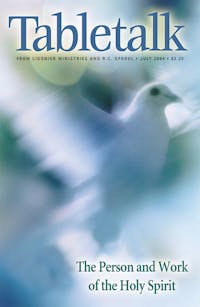
Request your free, three-month trial to Tabletalk magazine. You’ll receive the print issue monthly and gain immediate digital access to decades of archives. This trial is risk-free. No credit card required.
Try Tabletalk NowAlready receive Tabletalk magazine every month?
Verify your email address to gain unlimited access.
In one form or another, I have heard cries of the heart many times over the years. People hurt deeply. We live in a world where, for believer and unbeliever alike, there is pain, heartache, and the experience of tragedy. It is all so very confusing for us as Christians.
“Where is God when I hurt so bad?” “I feel so alone — ultimately I am the only one who can face this illness. Sure, I am glad that my husband and children are close, but I am the one who is sick, and I know I will have to go through this alone.”
I wish God were right here with me. It hurts so bad. How can He make me feel better if He is so distant and far away; “out there?”
The pain causes us to struggle and doubt the promise that Jesus is with us and even in us. “And behold, I am with you always, to the end of the age” (Matt. 28:20).
At first glance, it appears that He is elsewhere. Our theology even teaches that Christ is gone. Our Creeds affirm the biblical truth of the ascension; that Christ “sits at the right hand of the God the Father.”
So where is He when we need Him? Where is He when we feel alone? Is it realistic to think that God wraps us in His arms to keep and encourage even as a parent would for their hurting child? If we are His children, and God is truly our Father, can’t we properly expect God to provide comfort and consolation even as our parents would (especially since parental love is but a taste or reflection of the love of our heavenly Father)?
This last Christmas we celebrated the gift of Emmanuel — “God with us.” Would God come to be with us only such a short time, and then leave us alone and stranded?
Like a “scene 2,” a further unfolding of the promise of Emmanuel is found in words given to Jesus’ disciples: “And I will ask the Father, and he will give you another Helper, to be with you forever” (John 14:16).
He warned His confused, and later, frightened disciples, that physically, He would leave. He would ascend from the earth into the heavens. Yet, He would not leave them alone. He would not leave them “God-less.” Even more, this would be a good thing; though, at the time, they could not imagine so. While with us, Christ faced barriers or limits. He could not be everywhere at the same time in his human nature. So, how much greater is it that, once ascended and crowned as King, He sent His Spirit who knows no such boundaries or limitations? He came as “another” of the same (this is the idea behind the wording). He came as another Helper or Counselor. He came as another Emmanuel to be with us and in us forever — so we would not have to be alone.
Notice the words of the Apostle Paul as he reminded the Galatian Christians of what and who we have as a result of God’s Spirit living with us, and more, living in us: “And because you are sons, God has sent the Spirit of his Son into our hearts, crying, ‘Abba! Father!’” (Gal. 4:6).
The Holy Spirit is actually the Spirit of Christ Himself. When Christ gave us His Spirit, He was giving Himself. The Spirit is not given as a second round as if this were a tag-team wrestling match and Christ needed a break. The Spirit has come to share with us all the benefits that Christ earned for us. The Son and the Spirit are so closely identified that the Spirit Himself can be called the Spirit of the Son and the “Spirit of Christ”(see Phil. 1:19; 1 Peter 1:11).
We are not left alone. He is a promise that makes a world of difference — God is not just with us, but in us. And even more, He is in us and has wrapped His arms around us in such a way that we can cry with relief, “Daddy, Daddy” (Abba). I can rest knowing I am in the arms of the Spirit of God Himself.
There have been times I simply have not known how to pray. As a pastor, I can feel weak and confused when I am called on to pray for someone who feels desperate. I remember when I was hospitalized for a week going through test after test for my own heart problems. Every day it seemed that the doctor found something else wrong. I remember one nurse coming in saying, “I am sorry, I am so sorry,” as she learned of my unusual heart disease. In the forefront of my own thinking was the death of my Father whose heart failed when he was just 29 years old. By the time I went in for my pacemaker-defibrillator implant, I was not sure how to pray. I found great comfort knowing God’s Spirit who was in me and very much with me, was also interceding for me in ways I could not grasp.
“Likewise the Spirit helps us in our weakness. For we do not know what to pray for as we ought, but the Spirit himself intercedes for us with groanings too deep for words” (Rom. 8:26) .
God’s Spirit in and with us means we are not alone, and whether on the mountain tops or in the valley of the shadow of death, He is there to sustain us and plead our case. We can rest knowing that truth.
